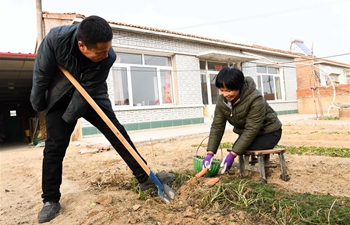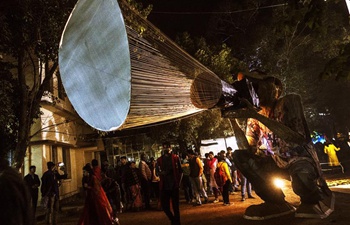
Afghan students read books at a library in Kabul, capital of Afghanistan, Nov. 22, 2018. Hamid Omar, who once wanted to leave Afghanistan after a deadly suicide bombing killed his sister in Kabul, has now established a small library to continue with her dreams.(Xinhua/Rahmat Alizadah)
by Farid Behbud
KABUL, Nov. 30 (Xinhua) -- Hamid Omar, who once wanted to leave Afghanistan after a deadly suicide bombing killed his sister in Kabul, has now established a small library to continue with her dreams.
Rahila, Omar's mere sister, was killed along with 48 of her classmates in an Islamic State (IS) claimed suicide attack in Mawoud Academic center in Dasht-e-Barchi, a populated neighborhood in west of the Afghan capital in mid August.
Noisy and irritant sirens of rushing ambulances were heard along the roads to hospitals, when Omar and his father came out of their homes to search Rahila.
A few weeks after the incident, a twin suicide attacks, claimed by the IS, took the lives of two journalists and 20 other civilians in the same area.
In the attack, a suicide bomber shot dead a guard of a gym at its gate and then entered the facility, blowing his explosive-packed vest, killing at least 20 civilians and wounding numerous others, inside the compound, full of spectators of a wrestling match.
Two local journalists were killed and four others wounded, following a car bomb attack occurred not far away from the gym, making Omar feel disappointed of his country's fragile security situation.
"How could I live in Afghanistan, a country, I wonder, when will peace come?" said Omar, with a shaky voice, who once wanted to quit Afghanistan and seek refuge abroad.
"Rahila's main dream was to become an economist and serve her country, but she along with all her wishes is now buried at the heart of the hillside, but by establishing this library and naming it after her (Rahila Munji Library), I wanted to forget about leaving my country and planned to make her dreams come true," Omar told Xinhua.
The main aim of the library, he said, was to promote the culture of studying and book-reading among the students and providing them with computer and Internet facilities, as well as funding their access to higher education.
Spending 5,000 U.S. dollar to establish, the mini library, with daily visitor number up to 90, including 60 percent of female readers, contains over 4,500 books.











